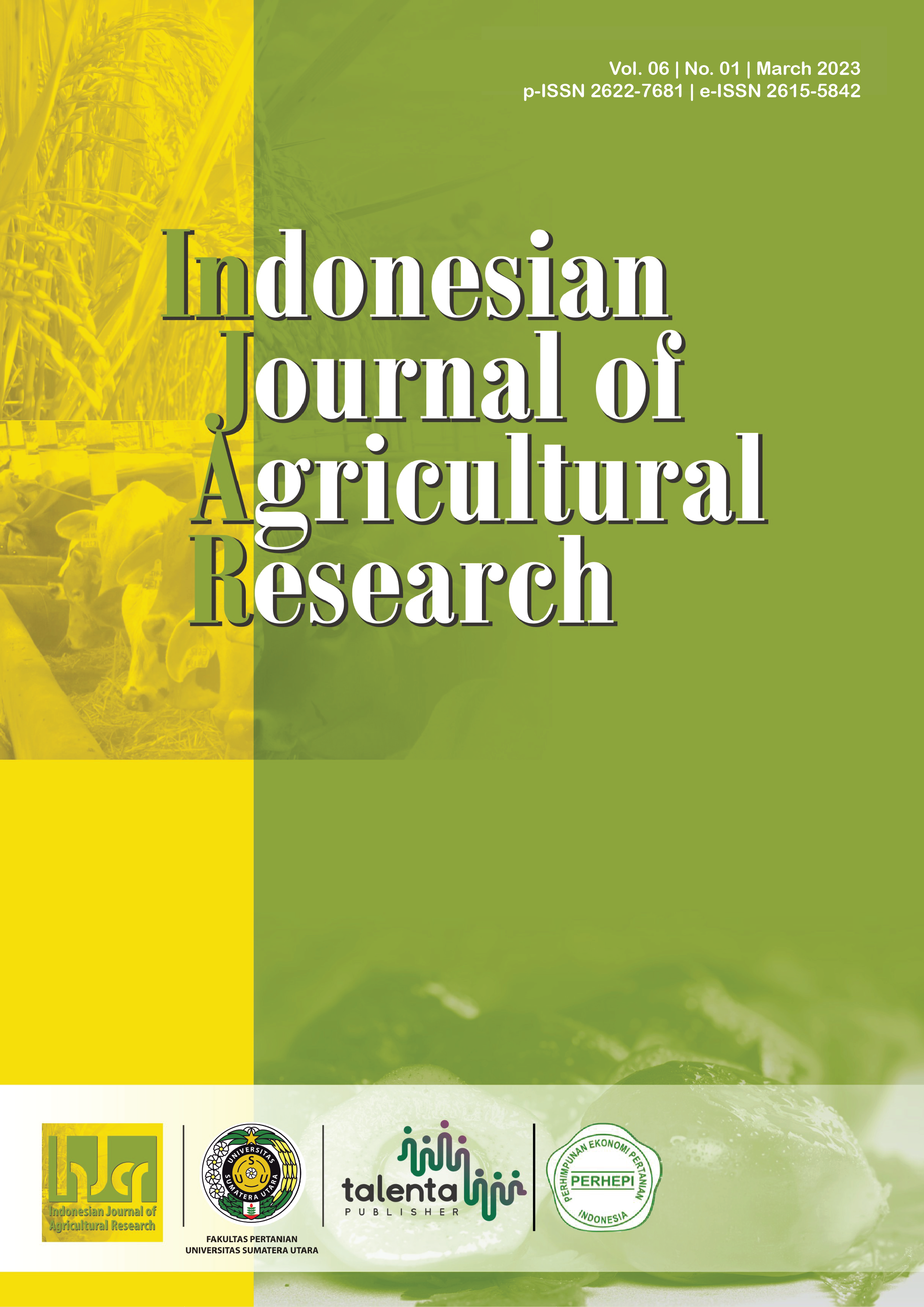Effect of Fulani Herdsmen Grazing Activities on Food Crop Production among Farm Youth in Nigeria
DOI:
https://doi.org/10.32734/injar.v6i01.8844Keywords:
coping strategies, farm youth, food crop production, fulani herdsmen, grazing activitiesAbstract
This study investigated the effect of herdsmen grazing activities on food crop production among farm youth in Nigeria. Data were collected from 120 farm youth through a structured interview schedule with a multi-stage selection process. Data analysis was done using appropriate statistics. The results reveal mean age and experience in farming of the youth were 29.03± 1.9 years and 11.11 ±7.22 years, respectively. Many (69.2%) of them were male with at least 77.5% having primary school education, and 60.88% had experienced the occurrence of Fulani herdsmen grazing activities in the past three years. In addition, 98.3 percent experienced a high effect of Fulani herdsmen grazing activities on their food crop production. Verbal warning (mean = 2.96) ranked highest among coping strategies adopted by farm youth, followed by local security (mean = 1.94) among others. At p<0.01, the perception of the grazing activities (r = 0.595), experience in farming (r = 0.411), and coping strategies (r = 0.446) had a substantial association with the effect of the Fulani herdsmen grazing activities on food crop production. The study then concluded that the Fulani herdsmen grazing activities had a high effect on the food crop production of the farm youth.
Downloads
References
International Labour Organization, “Employment in agriculture (% of total employment) (modeled ILO estimate) | Data,” World Bank Group. 2017. [Online]. Available: https://data.worldbank.org/indicator/SL.AGR.EMPL.ZS
H. I. Obadiah and A. Shekaro, “Survey of tick infestation in cattle in Zaria abattoir, Nigeria,” J. Vet. Adv., vol. 2, no. 2, pp. 81–87, 2012.
D. O. Torimiro and A. A. Oluborode, “Towards achieving food security in Africa: Meeting the sustainable needs of crop farm youth in southwest Nigeria,” J. Appl. Sci. Res., vol. 2, no. 4, pp. 242–247, 2006.
S. N. I. Anasi, “Curbing youth restiveness in Nigeria: The role of information and libraries,” 2010.
A. C. Okoli and G. A. Atelhe, “Nomads against natives: A political ecology of herder/farmer conflicts in Nasarawa state, Nigeria,” Am. Int. J. Contemp. Res., vol. 4, no. 2, pp. 76–88, 2014.
O. Roseline and O. Amusain, “Effect of Fulani herders’ intrusion on the economic livelihood of crop farmers in Yagba East Local Government Area of Kogi State, Nigeria,” Age (Omaha)., vol. 21, no. 40, p. 19, 2017.
D. O. Torimiro, “Fulani Herdsmen and Grazing Activities in Southwestern Nigeria: Yoruba Farm Youths’ Perception Analysis,” Stud. Tribes Tribals, vol. 18, no. 1–2, pp. 12–20, 2020, doi: 10.31901/24566799.2020/18.1-2.424.
S. M. Yakubu et al., “Effects of Farmer-Herder Conflicts on Rural Households Food Security in Gombe State, Nigeria,” J. Agric. Ext., vol. 25, no. 1, pp. 11–20, 2020.
E. A. Kehinde, “Socioeconomic and environmental factors influencing conflict between crop producers and pastoralists In Kabba‑Bunu local government area of Kogi State, Nigeria,” Unpubl. Ph. D. Thesis, Dep. Agric. Econ. Rural Sociol. Ahmadu Bello Univ. Zaria, 2011.
K. S. Obaniyi, A. Kolawole, A. Ajala, A. Adeyonu, and A. Oguntade, “Assessment of crop farmers coping strategies to pastoralism/nomad activities in Nigeria,” Open Agric., vol. 5, no. 1, pp. 219–226, 2020.
J. O. Ayinde et al., “Production and consumption of underutilised indigenous vegetables (uivs) among men and women farmers: Evidence from Southwest Nigeria,” Ife J. Agric., vol. 28, no. 1, pp. 35–45, 2017.
O. O. Fasina, “Perception of interpersonal relationship between pastoralist and crop farmers in Ondo State. Nigeria,” Niger. J. Rural Sociol., vol. 17, no. 2202-2019–1119, pp. 7–13, 2017.
C. U. Nwaobiala and M. O. Ogbonna, “Adoption determinants and profitability analysis of okra farming in aninri local government area (LGA) of Enugu State, Nigeria,” Discourse J. Agric. Food Sci., vol. 2, no. 1, pp. 1–10, 2014.
O. Eyekpimi, “History of Fulani herdsmen and farmers clashes in Nigeria,” Retrieved Oct. 2nd, 2016.
“Women lament herdsmen’s destruction of farmlands, crops in Edo community _ The Guardian Nigeria News - Nigeria and World News — Nigeria — The Guardian Nigeria News – Nigeria and World News.”
Published
How to Cite
Issue
Section
Copyright (c) 1970 Indonesian Journal of Agricultural Research

This work is licensed under a Creative Commons Attribution-ShareAlike 4.0 International License.








